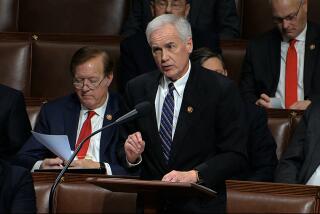The Cultural Legacy of Impeach
WASHINGTON — When the Abbe Sieyes was asked what he had done during the French Revolution, he answered, “I survived.” That’s President Bill Clinton’s legacy, too. He survived. 1998 will go down as the year when the country witnessed one of the greatest feats of political dexterity in U.S. history.
After all, the president didn’t just lie under oath. He lied bald-faced to the American people when he said on Jan. 26, “I’m not going to say this again. I did not have sexual relations with that woman, Ms. Lewinsky.” Pretty emphatic, huh? Well, seven months later, he finally told the truth: He did have something that might be construed as sexual relations with that woman, depending on the legal definition of “sexual,” “relations” and “woman.” Clinton survived because he has an uncanny instinct for understanding how the American public thinks and feels. He knew something nobody else in Washington knew: Americans understand the difference between private behavior and public performance. By defiantly continuing to do his job--remember his masterful State of the Union speech--Clinton could persuade people that none of this mattered.
What clinched the president’s victory was the crazy decision by House Republican leaders to release independent counsel Kenneth W. Starr’s report and the president’s videotaped testimony, thinking the scandalous details were sure to finish the president off. What they did instead was confirm the suspicion that this was “just about sex” and, therefore, nobody’s else’s business. Not the independent counsel’s business. Not Congress’s. Not the press’s. It was a colossal political blunder and ended up finishing off House Speaker Newt Gingrich (R-Ga.).
Now we’re in the end game, and it’s Republicans who are on the spot. The prevailing view among congressional Republicans is that the proper punishment would be impeachment but no conviction. That is, the House should vote to impeach Clinton, even if there’s not the remotest chance that two-thirds of the Senate will vote to remove him from office.
What would be the point? In a word, disgrace. Impeachment would go down on Clinton’s permanent record. He would be one of only two presidents to get impeached, even if he, like Andrew Johnson before him, managed to stay in office.
That’s why an impeachment vote would be so traumatic. The term “impeach” has a deep emotional resonance with Americans, even if you explain to them that impeachment and removal from office are two different things. Which is exactly what last week’s Gallup poll did. Interviewers told respondents, “As you may know, removing a president from office involves two major steps in Congress. First, the House of Representatives must vote on whether there is enough evidence to bring a president to trial before the Senate. This step is called ‘impeachment.’ Next, the Senate must vote on whether to remove the president from office or not.”
People were asked, first, would you want your member of Congress to vote to impeach the president and send the case to the Senate for trial? The answer--64% to 33%, “no.” Then the poll asked, if the House votes to impeach, would you want your senator to vote to convict the president and remove him from office? The answer--64% to 33%, “no.” The public sees no difference between “impeachment” and “removal from office.”
That’s why House members are approaching the impeachment vote with so much caution. It’s like voting to behead the king during the French Revolution. To vote “oui” is to be forever labeled a regicide. As the Abbe Sieyes was labeled after the trial of Louis XVI, at which he was called on to explain his position to the French convention. His speech: “Death. No discussion.”
Senate Republicans are terrified the House will vote to impeach next month. That will force the Senate to put the president on trial, a process that could take up most of next year. Right now, it’s likely that the House Judiciary Committee will approve at least one article of impeachment, for perjury, on a straight party-line vote. But Republicans appear to be a few votes shy of a majority if impeachment comes to a vote by the entire House.
If the impeachment vote fails, the president will escape with no penalty at all. That’s an outcome even most Democrats would be unhappy with. So members from both parties are frantically trying to come up with a censure resolution that could command majority support. Like the one being proposed by Rep. Paul McHale (D-Pa.): Congress “does hereby censure and condemn” Clinton because he committed perjury, obstructed justice and “acted in a manner contrary to his trust as president.”
If the censure statement is too weak, many Republicans will oppose it as meaningless. If it’s too strong, a lot of Democrats will oppose it as going too far. The only thing Congress cannot do is impose any penalty on the president. That would violate the separation of powers. The Constitution allows for only one penalty: impeachment and removal from office.
Is there any remote similarity between the impeachment of Johnson in 1868 and the potential impeachment of Clinton 130 years later? There is, as it turns out. This country went through a terrible civil war in the 1860s. More than 600,000 Americans were killed. The bitter cultural division of that war, North versus South, infected partisan politics for decades afterward. Johnson’s impeachment was a direct product of those hatreds.
Johnson was a Union Democrat from Tennessee. The Republicans who controlled Congress deeply resented his conciliatory policy toward the conquered South. In a straight party-line vote, the House impeached Johnson on dubious charges of violating congressional prerogatives. After a three-month trial, the Senate came one vote shy of convicting him and removing him from office.
This country went through a cultural civil war in the 1960s. At the heart of the conflict were the more than 57,000 Americans killed in Vietnam. The bitter divisions created by the 1960s, liberal versus conservative, have poisoned American politics for more than 30 years. The effort to impeach Clinton is a direct product of those hatreds.
The puzzle throughout Clinton’s presidency is why he is hated by so many Americans. After all, Clinton fashions himself a New Democrat who has led his party back to the center. Nonetheless, liberals have been powerfully loyal to Clinton, as loyal as conservatives were to Ronald Reagan during the Iran-Contra scandal. Why? Not because of his policies. Clinton has sold liberals out on welfare reform, free trade and a balanced budget. Clinton is a hero to liberals because of his values. They’re the values of the ‘60s. Tolerance of alternative lifestyles (“gays in the military”). A “modern” marriage. And empathy, the quality that got him elected. It became something of a joke, but back in 1992, voters really wanted a president who could “feel their pain.”
There’s a legion of Clinton-haters. They hate him because they hate the ‘60s, which they believe corrupted American culture with an ethic of self-indulgence. (For details, see any book by Bill Bennett.) Speaking of self-indulgence, the country now has a president famous for his, well, appetites: The first president to come out of the culture of the ‘60s. Conservatives used to revile him as Clinton the draft dodger. Now they revile him as Clinton the sex fiend. (For details, see the Starr report.)
We know which side won the Civil War of the 1860s. But it’s not clear which side won the cultural war of the 1960s. During the Reagan era, traditional values seemed to triumph. But after a year of frustration and outrage over the public’s reaction to the Monica S. Lewinsky scandal, conservatives are ready to declare defeat.
The thing that saved Clinton, however, is not his liberalism. It’s his populism. To many Americans, Clinton is “one of us,” a leader ordinary people can identify with. His strengths are “our strengths.” Tthat may be why so many Americans are willing to forgive him. They see his weaknesses as “our weaknesses.”
More to Read
Get the L.A. Times Politics newsletter
Deeply reported insights into legislation, politics and policy from Sacramento, Washington and beyond. In your inbox three times per week.
You may occasionally receive promotional content from the Los Angeles Times.










